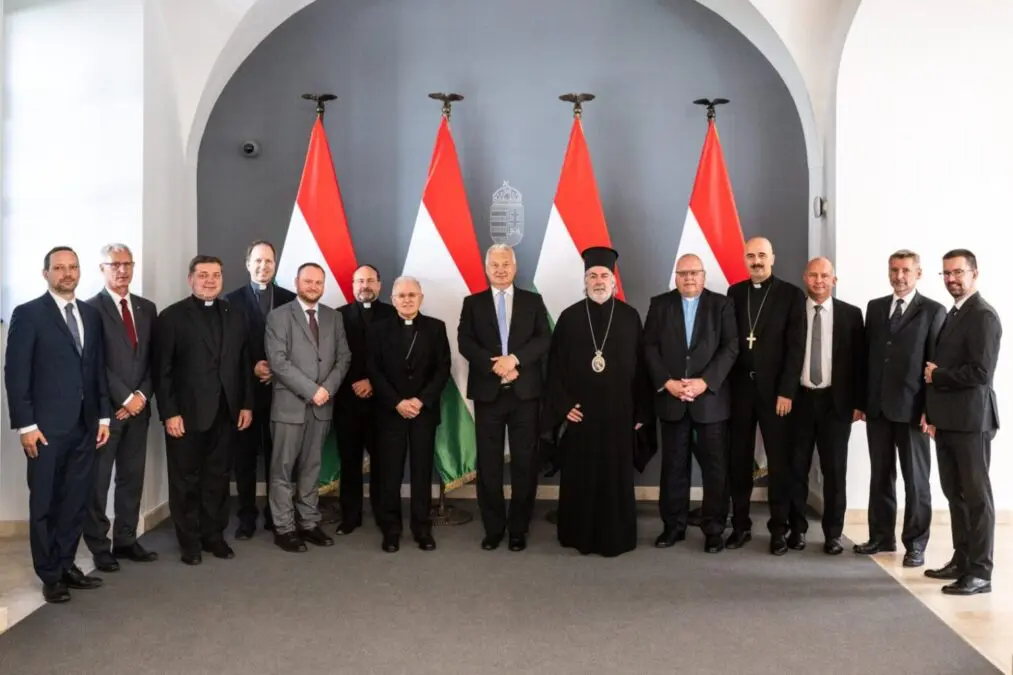An ecumenical delegation representing the Commission of the Bishops’ Conferences of the European Union (COMECE) and the Conference of European Churches (CEC) met with Hungarian Deputy Prime Minister Zsolt Semjén on Monday, 24 June 2024, in Budapest, to discuss their concerns and perspectives in view of the incoming Hungarian EU Presidency. READ THE COMECE-CEC CONTRIBUTION
The meeting was an occasion to present Churches’ contributions to the main policy priorities of the Hungarian Presidency of the EU Council to start on the 1st of July 2024. These policy recommendations were elaborated in a reflection document and handed over to the Hungarian Deputy Prime Minister Zsolt Semjén.
EU Churches highlighted the need recommit to the founding values of the European Union, with a particular emphasis on unity and solidarity as guiding principles for the forthcoming in the EU strategic agenda.
The members of the delegation shared their concern about the increasing social and political polarisation in EU Member States, as well as about tendencies to misuse and instrumentalise religion. H.E. Mgr. Mariano Crociata, President of COMECE, called on the incoming Hungarian EU Presidency to “promote social cohesion and address the issue of polarisation”, considered a dangerous phenomenon that divides our societies through the spread of reductive ideologies, disinformation, populism, xenophobia, radicalisation and violent extremism.
Mgr. Crociata also wished for the next Presidency of the EU Council to prioritise the protection and care of the most vulnerable,
“assisting those who suffer from different form of poverty and exclusion, and addressing demographic challenges by promoting at the EU level policies that recognise the central role of the family in society, including through increased investment in parenthood”.
The ecumenical delegation also addressed the issue of peace, emphasising the need to establish peace and stability on the European continent and beyond. “As peace in Europe can no longer be taken for granted, peacebuilding efforts have to be constantly renewed based on the principles of truth and justice, in full respect of international law”, stated H.Em. Archbishop Nikitas, President of CEC.
“We encourage the Hungarian EU Council Presidency to act as a united, trustful and integrating force and credible peace broker amid violent conflicts and tensions in EU’s neighbourhood, the Middle East, the Caucasus region and other parts of the world”, he continued.
During the meeting, COMECE and CEC representatives urged the Hungarian EU Presidency to support a citizen-centred, credible and fair EU enlargement process with the Western Balkan as well as with Eastern European countries.
Appreciating the recognition of the distinctive contribution of Churches in the official programme of the Hungarian Presidency of the Council of the European Union, the ecumenical delegation expressed hope that the EU-Churches Article 17 dialogue would be strengthened during this Presidency and beyond.
Beside Deputy Prime Minister Zsolt Semjén, the ecumenical delegation also met with Miklós Soltész, Secretary of State responsible for Churches, and Tristan Azbej, Secretary of State responsible for programmes to help persecuted Christians and for the Hungary Helps Programme.
Together, COMECE and CEC represent a membership of around 380 million citizens throughout EU Member States. They are strongly committed to accompany and support the European integration process on the basis of Christian values such as human dignity, respect, justice, peace and the integrity of creation.
Meetings with EU Presidencies are part of a long-standing tradition supported by Article 17 of the Treaty on the Functioning of the European Union (TFEU), which foresees an open, transparent and regular dialogue between the EU and Churches, religious associations or communities.
The CEC-COMECE delegation was composed of:
- H. E. Mgr. Mariano Crociata, COMECE President and Bishop of Latina;
- H. Em. Archbishop Nikitas of Thyateira and Great Britain of the Ecumenical Patriarchate, CEC President;
- Rev. OKR. Frank Kopania, Protestant Church in Germany, CEC Vice-President;
- H. E. Mgr. Gábor Mohos, Auxiliary Bishop of Budapest-Esztergom, Bishop-Delegate to COMECE;
- Bishop Péter Kondor, Ecumenical Council of Churches in Hungary;
- Rev. Fr. Manuel Barrios Prieto, COMECE General Secretary;
- Mgr. Tamás Tóth, General Secretary of the Hungarian Catholic Bishops’ Conference;
- Dr. Vilmos Fischl, General Secretary of the Ecumenical Council of Churches in Hungary;
- Rev. Dr. Peter Pavlovič, CEC Programme Officer for Theology and Studies;
- Mr. Marek Mišák, COMECE Policy Adviser for EU External Relations.







